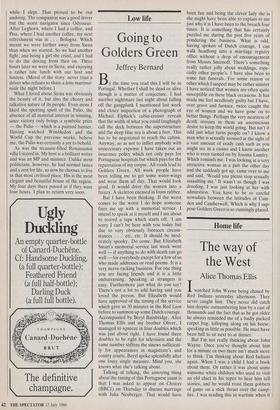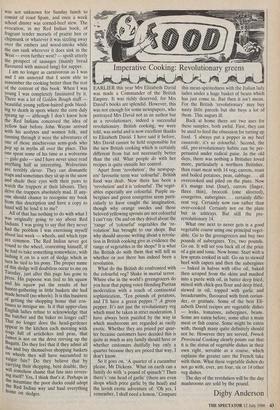Home life
The way of the West
Alice Thomas Ellis
Iwatched John Wayne being chased by Red Indians yesterday afternoon, They never caught him. They never did catch him despite outnumbering him by a cast of thousands and the fact that as he got older he always reminded me of a badly packed carpet bag, lolloping along on his horse, speaking as little as possible. He must have been hell to sit next to•at dinner.
But I'm not really thinking about John Wayne. Once you've thought about him for a minute or two there isn't much more to think. I'm thinking about Red Indians again. When I was a child I had a book about them. Or rather it was about some winsome white children who used to visit an old chief in his tepee to hear him tell stories, and he would roast them gobbets of game on a stick thrust over the camp- fire. I was reading this in wartime when it was not unknown for Sunday lunch to consist of roast Spam, and once a week school dinner was corned-beef stew. The evocation, in my Red Indian book, of fragrant tender morsels of prairie hen or chipmunk or whatever it was sizzling away over the embers and wood-smoke while the sun sank wherever it does sink in the West — even further west? — spoilt utterly the prospect of sausages (mainly bread flavoured with minced lung) for supper.
I am no longer as carnivorous as I was and I am annoyed that I seem able to remember the cooking better than the rest of the content of this book. When I was young I was completely fascinated by it. There was a lot of Golden Bough stuff beautiful young yellow-haired gods bleed- ing to death in spots where the corn duly sprang up — although I don't know how the Red Indians conceived the idea of yellow hair before John Wayne arrived with his acolytes and women folk, and running through it were the adventures of one of those mischievous semi-gods who pop up in myths all over the place. This one spent some of his time as a wolverine — gulo gulo — and I have never since read anything half as interesting. Wolverines are terribly clever. They can dismantle traps and sometimes they sit up in the snow and shade their eyes with their paws to watch the trappers at their labours. They drive the trappers absolutely mad. If any- one should chance to recognise my book from this description and have a copy to hand will he lend it to me?
All of that has nothing to do with what I was originally going to say about Red Indians. I was going to say that they never had the problem I was exercising myself about last week — wheels, and which type are common. The Red Indian never got round to the wheel, contenting himself, if he had to take something somewhere, with lashing it on to a sort of sledge which in turn he tied to his pony. The proper name of this sledge will doubtless occur to me on Tuesday, just after this page has gone to press. His papoose was tied to his squaw and his squaw put the results of her hunter-gathering in little baskets she had made herself (no wheels). It is this business of getting the shopping home that con- tinues to intrigue me. Is it that upper-class English ladies refuse to acknowledge that the butcher and the baker no longer call? That no longer does the head-gardener appear in the kitchen each morning with trugs full of artichokes and peas, that James is not on the drive revving up the Bugatti. Do they feel that if they admit all this and buy themselves shopping baskets on wheels they will have succumbed to vulgar fate? Do they believe that by carrying their shopping, bent double, they will somehow shame that fate into revers- ing itself? Yes, I think that's it. Perhaps in the meantime the poor ducks could adopt the Red Indian way and haul everything home on sledges.



















































 Previous page
Previous page